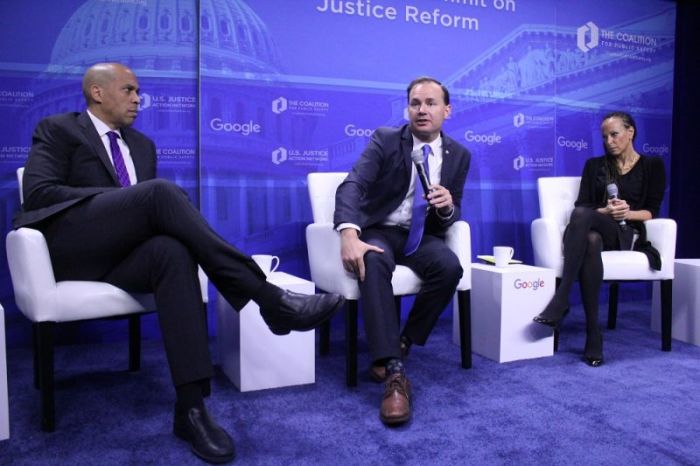See Why Conservative Senator Mike Lee Praised Barack Obama

"You put any conventional conception of American politics, you will see him on one pole and me towards the other," Booker said. "But we are two Americans, who in this time of fierce divisiveness in our country, see each other, first and foremost, as fellow Americans. When I joined Congress, we didn't look to find what divided us, we looked for common ground."
Booker explained that his interest in the criminal justice reform movement comes as he was awakened to the fact that criminal justice realities in the U.S. violate American ideals and principles, such as "equal justice under the law," "injustice anywhere is a threat to justice everywhere," and "give me liberty or give me death."
"We are imprisoning people. Let's call them political prisoners because but for political action, they would be free," Booker said. "There are people in jail right now because of the 100 to one crack-cocaine disparity [passed in 1986] that for the wisdom of the Congress said that's wrong. The wisdom of the Congress said that is wrong and unjust and we are going to change it but they didn't make it retroactive. So, there are people rotting in prison watching people do the same crime or worse come in and out of prison and they are stuck there. Their very existence casts a shame over the values of our country."
Booker also stressed the injustice in the fact that drug laws are much more heavily enforced in poor and minority communities than they are in well-to-do communities.
"There is no difference between blacks and whites for using drugs, selling drugs, none whatsoever," Booker said. "If you look at poor communities, poor folks have a much more likely chance of being stopped. At Stanford University, no one is stopping us and frisking us on the way home from a frat party but there is a lot of drug use going on. ... but nobody is stopping and frisking and no FBI investigations are done. ... But in urban communities, poor communities, communities of color those things are going on."
"Suddenly, you have realities where in some of these communities, one out of every two black men has been arrested," he added. "What does that do to the economy? We know overall, America would have 20 percent less poverty overall if we had incarceration rates like our industrial peers."
A bipartisan bill that is currently sitting in Congress is the Sentencing Reform and Corrections Act of 2015. The bill would amend the federal criminal code to reduce certain mandatory minimums for drug offenses and gives judges more discretion in lower-level drug offenses. Also, the bill would give inmates the opportunity to participate in rehabilitation programs to qualify for early release.
The bipartisan bill passed through the Senate Judiciary Committee last October and is co-sponsored by 36 Senators from both sides of the political spectrum.
However, time is running out to pass the bill and put it on the president's desk before the legislative session ends. In fact, Sen. Thom Tillis, R-N.C., has said that he may not run for re-election in 2020 if the bill can't get passed.
"We are not at a historic moment. A historic moment will be a president signing legislation that transforms the situation," Booker said. "We are at a tragic moment where everyday that we go without acting, there are people in America who are living examples of how we are violating our principles and ideals as a country."
"There is a bipartisan bill and the days are ticking off the clock for getting it done," he added. "When you think of bipartisan coalition, you often think of Democrats and Republicans finding some place in the middle that pleases Democrats and Republicans. That is not the case for this bipartisan bill."





























